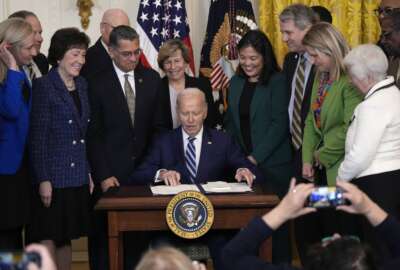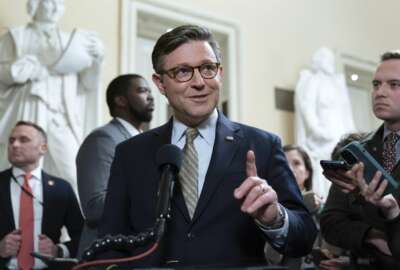OPM defends yo-yo effect of pay, benefits proposals
Director John Berry said the proposition in the 2013 budget request to increase pay by 0.5 percent and increase the contributions employees pay to their retirement...
wfedstaff | June 4, 2015 5:31 pm
This story was updated at 6:55 a.m. on Feb. 16 to reflect updates in the payroll tax deal negotiations.
Office of Personnel Management Director John Berry Wednesday defended the administration’s decision to offer both a 0.5 percent pay raise and a 0.4 percent increase in the amount federal employees will pay toward their retirement pensions in fiscal 2013.
“The President recognizes, for example in retirement, the world has shifted since the retirement system was last reformed in 1985,” Berry said in an interview with Federal News Radio. “That was the major change from the Civil Service Retirement System to the new Federal Employees Retirement System. I think federal employees appreciate and understand the defined contribution portion of the plan is a good benefit and it is one we want to retain. The President has not proposed to change that leg of the three-legged stool. But he is asking federal employees to keep this benefit and make sure the program is sound financially going forward, we are going to ask folks to pay a little more in contributions and we are going to phase that in over a very responsible time, over a three-year period.” 
For instance, the House this week is considering at least two different increases to the amount of money federal employees would contribute to their retirements. Lawmakers have reached a payroll tax deal that would require new federal employees to pay 2.3 percent of their salaries toward their defined benefit pensions. And under the surface transportation bill, Republicans are calling for a 1.5 percent increase phased in over three years.
Berry said the decision to lift the pay freeze was part of the recognition of how much feds have given up over the last two years. But, Berry said, workers also remain part of the solution to help trim the deficit.
“I think the President is again asking federal employees to step up, but we are doing it in a responsible manner that I think federal employees will appreciate and understand,” he said. “We are protecting the benefit, making sure we can still have a good solid program to protect the retirement and honor their service, and yet be fiscally responsible.”
No signal to negotiate
Berry said the administration’s proposal was not a signal to Congress that it is willing to negotiate over employee benefits.
Instead, he said it indicates just how far the administration is willing to go.
“The President put forth this proposal to the deficit commission last September. This is not a new idea. It’s one that has been out there before,” Berry said. “What the President’s budget does is it gives that proposal all the more solidity in terms of the executive branch has considered this very thoughtfully, and this is the proposal the President is willing to advance and defend. We don’t look at this at the beginning of the negotiation period. This is one that will protect our ability to recruit and retain our workforce. And the President is saying this is enough.”
The federal employee unions are trying to push back against any changes to retirement contributions.
“Essentially what this means — the passage of the payroll extension — everyone in the country will see an increase in their take home pay and federal employees will see cuts because they will be funding part of this proposal,” said Colleen Kelley, the president of the National Treasury Employees Union, during the press call Wednesday. “They will end up with a net loss in take home pay.”
In addition to having to answer about changes to employee pay and benefits, OPM also would have to deal with a 2013 budget that would be flat for a third straight year. Obama requested $91 million in discretionary spending for OPM in 2013, down from $98 million the two previous years.
Berry said the flat budget makes it tough on the agency, especially since it’s taking on new missions, such as adding Native American tribes to the Federal Employee Health Benefits Program and will be working with the Department of Health and Human Services to get multi-state health exchanges in place by 2014.
“That’s hard to do when you are held flat. We will make tough choices,” he said. “We will make wise choices and make sure we focus the resources where they are most urgently needed.”
Reducing the retirement backlog remains the top priority
One priority will continue to be the improved processing of retirement claims. OPM told a Senate committee earlier this month the backlog increased by 30 percent because of a rush of employees retiring in December 2011.
Berry said OPM already is seeing benefits from changes to how it processes claims. He said productivity is up by 20 percent because of process improvement suggestions from the Navy’s Lean Six Sigma team.
“They are looking at every step in our process,” he said. “When they have a good idea we have been immediately implementing it.”
OPM also is bringing back retired feds to work on these issues at the suggestion of the National Association of Active and Retired Federal Employees. Berry said the 8-to-10 retirees have made a significant difference in claims processing.
Berry said OPM has hired almost 100 new employees to work in the claims processing, but they are six months away from impacting the backlog because of training.
OPM also sent its first monthly report to Congress on how it’s eliminating the retirement claim backlog. Berry said it was well received by the House and Senate oversight committees, but there also were some questions about the data. He said OPM will address the questions in future reports.
“I’ve made clear very publicly that we will prioritize getting our hands around the retirement backlog,” he said. “And even it means I have to leave vacancies unfilled in other parts of my agency so that I can move those slots to have the space to hire the people I need to solve my retirement problem. I will do it.”
Budget includes policy changes too
Berry said some of the OPM budget decrease in 2013 would come from the ending of the retirement systems modernization effort. He said large project cost millions to run and oversee, so by virtue of ending the project, the budget request is reduced.
Along with the spending request, the 2013 budget includes a handful of policy mandates for OPM.
Berry said the agency will run a program to let workers who want to retire work in a part-time status for a period of time and mentor other feds.
The current structure is gives employees a disincentive to stay around because any money they earn is withdrawn from their annuity. Congress has approved the rehiring of annuitants without penalties in some critical areas such as acquisition, but not across the board.
Berry said the proposal is “a no brainer” because it will save money for the government by keeping talented people around longer who will pass along their knowledge.
The White House also called on OPM in the budget to lead an effort to identify critical skill gap areas.
Berry said agencies are issuing buyouts and early retirements, but they must be careful so as not to leave them shorthanded and create critical gaps.
“What the President asked us to do is rather than being reactive, let’s be proactive,” he said. “We will work with the Chief Human Capital Officer’s Council and the Government Accountability Office because they’ve identified this as a high risk area of government, to see if we could identify a very rigorous cross agency, cross government approach that leads to identifying critical skill gaps we all share, and then lets identify the 3-to-5 that are unique to your specific agency. We can go after and target and make sure we have a game plan for each one of them.”
Berry said OPM and the CHCO Council will spend a lot of time on the effort this year and he hopes to have it done before the end of 2012.
RELATED STORIES:
Federal unions claim sneak attack in unemployment insurance deal
House to vote on federal pension changes separate from highway bill
Senators take OPM to task over long wait for pensions
OPM tackles retirement backlog with more staff, better technology
Copyright © 2025 Federal News Network. All rights reserved. This website is not intended for users located within the European Economic Area.
Jason Miller is executive editor of Federal News Network and directs news coverage on the people, policy and programs of the federal government.
Follow @jmillerWFED






